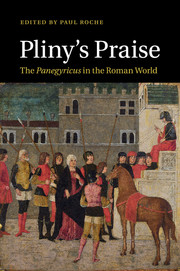Book contents
- Frontmatter
- Contents
- List of contributors
- Preface
- 1 Pliny's thanksgiving: an introduction to the Panegyricus
- 2 Self-fashioning in the Panegyricus
- 3 The Panegyricus and the Monuments of Rome
- 4 The Panegyricus and rhetorical theory
- 5 Ciceronian praise as a step towards Pliny's Panegyricus
- 6 Contemporary contexts
- 7 Politics and the sublime in the Panegyricus
- 8 Down the Pan: historical exemplarity in the Panegyricus
- 9 Afterwords of praise
- Bibliography
- Index locorum
- General index
6 - Contemporary contexts
Published online by Cambridge University Press: 05 June 2011
- Frontmatter
- Contents
- List of contributors
- Preface
- 1 Pliny's thanksgiving: an introduction to the Panegyricus
- 2 Self-fashioning in the Panegyricus
- 3 The Panegyricus and the Monuments of Rome
- 4 The Panegyricus and rhetorical theory
- 5 Ciceronian praise as a step towards Pliny's Panegyricus
- 6 Contemporary contexts
- 7 Politics and the sublime in the Panegyricus
- 8 Down the Pan: historical exemplarity in the Panegyricus
- 9 Afterwords of praise
- Bibliography
- Index locorum
- General index
Summary
Pliny's Panegyricus in praise of Trajan stands alone as the only significant piece of Latin prose epideictic to have survived from the early empire. This should not, however, obscure the fact that we do have other evidence for praise literature in Pliny's time. The issue of how to define Pliny's own era is also something which needs consideration. Not only Pliny's Panegyricus, but also the tenth book of the Letters, dealing with Trajan (reigned 98–117), provide of course an irresistible and powerful impulse to consider Pliny as part of the great age of Trajan, what his contemporary Tacitus was to describe at the opening of his Histories as a fortunate time, ubi sentire quae uelis et quae sentias dicere licet (‘when you can think what you want, and say what you think’, Hist. 1.1.4). This will accordingly begin with a brief glance at the culture of praise and blame, especially praise, in the early empire, before examining oratorical praise under Trajan, and then will move to consider how any inquiry into the contemporary contexts of the Panegyricus is not such a straightforward process, especially as the nature of what is and what is not contemporary is itself so important a theme in Pliny's treatment of Trajan.
- Type
- Chapter
- Information
- Pliny's PraiseThe Panegyricus in the Roman World, pp. 104 - 124Publisher: Cambridge University PressPrint publication year: 2011
- 7
- Cited by



